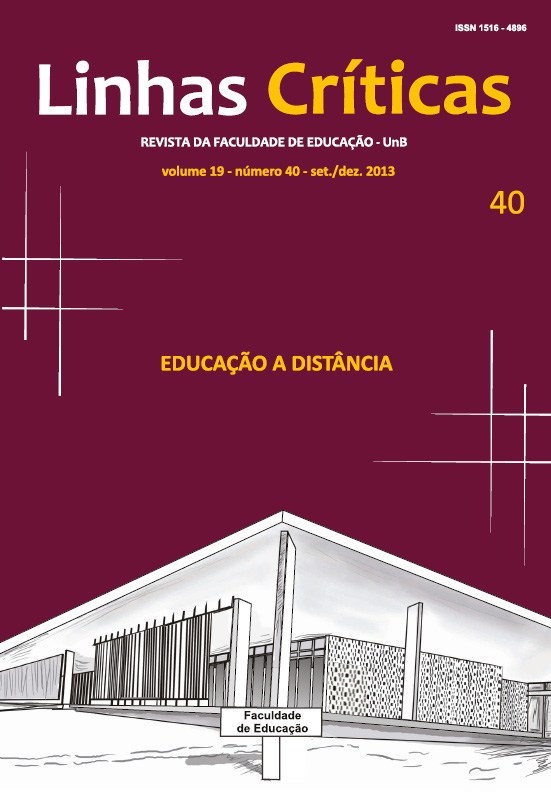Educational mediation of specific knowledge, in the e-Tec Brazil distance education program
DOI:
https://doi.org/10.26512/lc.v19i40.4198Keywords:
Distance Education, Educational MediationAbstract
This article presents an investigation of the process of educational mediation, conducted by tutors/professors, in a professionalizing distance education program, involving the specific knowledge covered by one of the subjects, and supported by digital technology. The study analyzed the conversation of the tutors/professors with the students, and used the technique of Collective Subject Discourse, from Lefèvre and Lefèvre. It became clear that educational practices that favor know how, properly monitored by the professors/researchers, favor the learning of specific content, by offering a collaborative mediation between professors/tutors and students.
Downloads
References
BEHRENS, Marilda Aparecida. Projetos de aprendizagem colaborativa num paradigma emergente. In: MORAN, José Manuel; MASETTO, Marcos Tarciso; BEHRENS, Marilda Aparecida. Novas Tecnologias e Mediação Pedagógica. São Paulo: Ed. 19, p. 67-132, 2012.
BROD, Fernando. Significar aprendizagens em informática na educação tecnológica através do desenvolvimento de projetos. Dissertação (Mestrado em Educação em Ciências) ”“ Universidade Federal do Rio Grande - FURG, 2011.
DURAN, David; VIDAL Vinyet. Tutoria: aprendizagem entre iguais. Porto Alegre: Artmed, 2007.
ESTEBAN, Maria. Pedagogia de projetos: entrelaçando o ensinar, o aprender e o avaliar à democratização do cotidiano escolar. In: JANSSEN, Felipe; HOFFMANN, Jussara; ESTEBAN, Maria (Org.). Práticas avaliativas e aprendizagens significativas: em diferentes áreas do currículo. Porto Alegre: Mediação, p. 81-92, 2003.
LEFÈVRE, Fernando; LEFÈVRE, Ana Maria. O discurso do sujeito coletivo: um novo enfoque em pesquisa qualitativa (desdobramentos). Caxias do Sul: Educs, 2005a.
LEFÈVRE, Fernando; LEFÈVRE, Ana Maria. Depoimentos e discursos: uma proposta de análise em pesquisa social. Brasília: Liber Livro Editora, 2005b.
LEFÈVRE, Fernando; LEFÈVRE, Ana Maria. Pesquisa de representação social: um enfoque qualiquantitativo: a metodologia do discurso do sujeito coletivo. Liber Livro Editora, 2010.
LÉVY, Pierre. Cibercultura. São Paulo: Ed. 34, 1999.
MATURANA, Humberto. A ontologia da realidade. Belo Horizonte: Ed. UFMG, 1999.
MATURANA, Humberto. Cognição, ciência e vida cotidiana. Belo Horizonte: Ed. UFMG, 2001.
MATURANA, Humberto. Ontologia del conversar. Revista Terapia Psicológica. Ano VII, v.10. p. 15-22, 1988.
MATURANA, Humberto; DÁVILA, Ximena Paz. Educação a partir da matriz biológica da existência humana. Tradução: Leda Beck. UNESCO. Chile: Revista PRELAC, 2006.
MATURANA, Humberto; VARELA, Francisco. A árvore do conhecimento: as bases biológicas da compreensão humana. São Paulo: Palas Athenas, 2001.
MORAN, José Manuel. Ensino e aprendizagem inovadores com tecnologias audiovisuais e telemáticas. In: MORAN, José Manuel; MASETTO, Marcos Tarciso; BEHRENS, Marilda Aparecida. Novas Tecnologias e Mediação Pedagógica. São Paulo: Ed. 19, p. 11-66, 2012.
NOGUEIRA, Nilbo. Pedagogia dos projetos: uma jornada interdisciplinar rumo ao desenvolvimento das múltiplas inteligências. São Paulo: Érica, 2001.
RODRIGUES, Sheyla. Rede de conversação virtual: engendramento coletivo singular na formação de professores. Tese (Doutorado em Informática na Educação) ”“ Universidade Federal do Rio Grande do Sul ”“ UFRGS. Porto Alegre: RS, 2007.
SHULMAN, Lee. Aprendizagem Baseada em Problemas (ABP) requer que os estudantes assumam os riscos de expor suas opiniões e ideias. Divulgación y Cultura Científica Iberoamericana. 2010. Disponível em <http://www.oei.es/divulgacioncientifica/entrevistas_071.htm> Acesso em: 06 Dez. 2012.
SOUZA Dileno; SILVA João; FLORESTA Maria (Org.). Educação a distância: Diferentes Abordagens Críticas. São Paulo: Xamã, 2010.
TARDIF, Maurice. Saberes Docentes e Formação Profissional. Petrópolis, RJ: Vozes, 2012.
ZABALA, Antoni (Org.). Como Trabalhar os Conteúdos Procedimentais em Aula. Porto Alegre: Editora Artes Médicas Sul Ltda, 1999.
Downloads
Published
How to Cite
Issue
Section
License
Copyright (c) 2016 Linhas Críticas

This work is licensed under a Creative Commons Attribution 4.0 International License.
Authors who publish in this journal agree to the following terms:
-Authors maintains the copyright and grants the journal the right of first publication, the work being simultaneously licensed under the Creative Commons Attribution License which allows the sharing of the work with recognition of the authorship of the work and initial publication in this journal.
- Authors are authorized to enter into additional contracts separately, for non-exclusive distribution of the version of the work published in this journal (eg publish in institutional repository or as a book chapter), with acknowledgment of authorship and initial publication in this journal.
-Authorers are allowed and encouraged to publish and distribute their work online (eg in institutional repositories or on their personal page) at any point before or during the editorial process, as this can generate productive changes as well as increase the impact and the citation of published work (See The Effect of Free Access).



